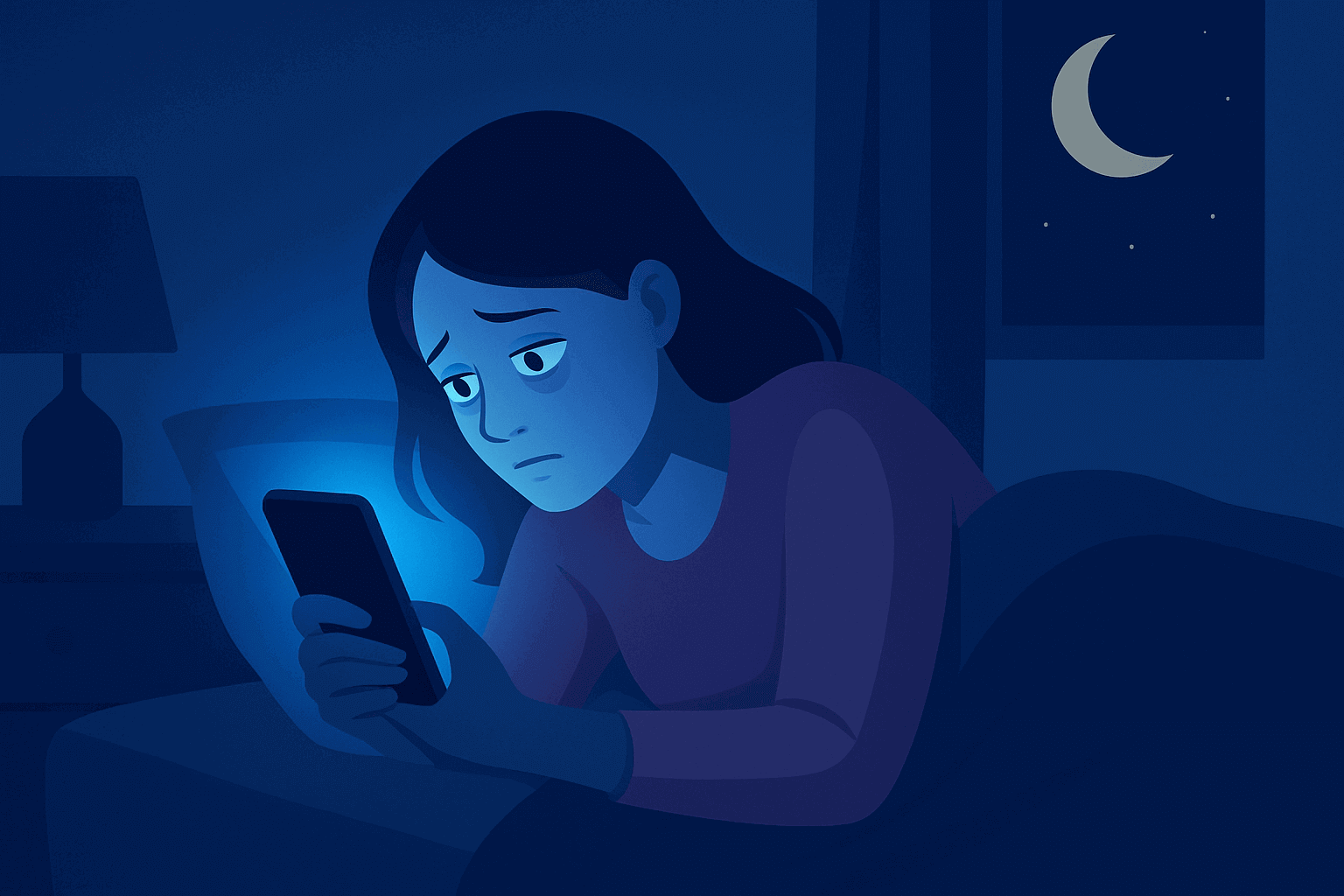💤 Pre-Sleep Habits That Seriously Affect Sleep Quality
Introduction
In today's hyperconnected world, many of us go to bed exhausted yet remain wide awake. While we often blame stress or insomnia, the real culprit can be found in our own nightly routines. Seemingly harmless habits—like checking messages, eating a late dessert, or even doing a quick workout—can disrupt the delicate neurochemical balance that leads to quality sleep.
This article explores the scientifically proven ways pre-sleep behaviors affect your body's ability to rest, and how to reverse those effects to finally enjoy the kind of sleep your body deserves.
1. Blue Light Exposure from Screens
Smartphones, tablets, and TVs emit blue light, which suppresses melatonin—the hormone that signals your brain it's time to sleep. Research from the Sleep Foundation shows that even 30 minutes of exposure before bedtime can delay melatonin release by up to an hour.
Why it matters:
Blue light tricks your brain into staying alert, mimicking daylight. This keeps your internal clock (circadian rhythm) out of sync.
How to fix it:
- Stop using digital devices at least 60–90 minutes before bed.
- Use night mode or blue light filters.
- If necessary, wear blue light–blocking glasses during evening screen time.
2. Late-Night Eating and Caffeine Intake
A common misconception is that food helps you "settle down." In reality, heavy or spicy meals before bed can cause acid reflux, elevated heart rate, and digestive discomfort—all of which keep your body active when it should be winding down.
Caffeine, found not only in coffee but also in chocolate and green tea, can linger in your system for 6–8 hours. Even an afternoon latte can affect how quickly you fall asleep.
Sleep-friendly alternatives:
- Opt for light snacks like bananas, almonds, or warm milk.
- Avoid caffeine after 2 p.m.
3. Intense Workouts Before Bed
Exercise boosts adrenaline, heart rate, and core temperature—all beneficial during the day but counterproductive at night. Studies show that late-evening high-intensity training delays the drop in body temperature needed for deep sleep.
Better approach:
- Schedule workouts in the morning or early evening.
- Try gentle yoga or stretching before bed instead, to promote relaxation and release muscle tension.
4. Alcohol and "Nightcap" Misconceptions
Alcohol may seem to help you fall asleep faster, but it reduces REM sleep, the stage responsible for emotional processing and memory consolidation. This often leads to fragmented sleep and early awakening.
Science says: Even moderate alcohol consumption within three hours of bedtime increases the likelihood of sleep disturbances by up to 40%.
Healthier choices:
- Replace alcohol with calming herbal teas such as chamomile or valerian root.
- If you do drink, stop at least three hours before bedtime.
5. Stressful Activities and Emotional Stimulation
Checking work emails or engaging in heated discussions before bed keeps your brain in problem-solving mode. Cortisol, the stress hormone, stays elevated, delaying the natural production of melatonin.
How to unwind:
- Set a digital cutoff time each night.
- Practice deep breathing, journaling, or mindfulness before sleep.
- Maintain a calming bedtime ritual—same time, same steps—to cue your brain that rest is coming.
6. Bedroom Environment: Noise, Light, and Temperature
Even minor disturbances—like blinking lights or inconsistent temperatures—can break your sleep cycles. The optimal sleep temperature for most people is 18–20°C (65–68°F).
Checklist for ideal sleep environment:
- Total darkness (blackout curtains or eye mask)
- Quiet atmosphere (or soothing white noise)
- Comfortable mattress and breathable bedding
7. Irregular Bedtimes and Social Jet Lag
Many adults maintain inconsistent sleep schedules, especially on weekends. This causes "social jet lag," where your body's internal clock becomes misaligned with your weekday routine.
Fix:
- Go to bed and wake up at roughly the same time every day, even on weekends.
- Morning sunlight exposure can help reset your circadian rhythm naturally.
Conclusion
Your sleep quality is shaped by what you do before you close your eyes. A few mindful changes—reducing screen time, choosing lighter meals, and managing stress—can transform your nights from restless to restorative.
Sleep is not a switch you turn off; it's a process you prepare for. Respecting that process is one of the simplest ways to improve your health, mood, and daily performance.
Key Takeaways
| Habit | Negative Impact | Healthy Alternative |
|---|---|---|
| Screen time | Blue light delays melatonin | Stop 1 hour before bed |
| Late meals | Indigestion, reflux | Light snacks only |
| Alcohol | Reduced REM sleep | Herbal teas |
| Stressful work | Elevated cortisol | Mindfulness, journaling |
References
- Sleep Foundation. The Effects of Blue Light on Sleep. (2023)
- National Institute on Alcohol Abuse and Alcoholism. Alcohol and Sleep Disruption. (2024)
- Harvard Health Publishing. Caffeine and Sleep: How Long Does It Last? (2023)
Related Articles
- The Effect of Intimacy Before Sleep — Is It Good or Bad for Your Sleep?
- How to Improve Your Sleep Quality: Science-Backed Tips and Tricks!
- The Cost of Sleep Deprivation: How it Affects Your Brain and Body

